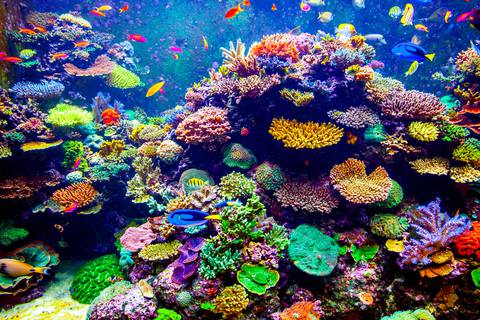(单词翻译:单击)
These are difficult inconsistencies. As Richard Fortey observes: "Somehow it does not seem satisfying just to call them 'lucky ones' and leave it at that." If, as seems entirely likely, the event was followed by months of dark and choking smoke, then many of the insect survivors become difficult to account for. "Some insects, like beetles," Fortey notes, "could live on wood or other things lying around. But what about those like bees that navigate by sunlight and need pollen? Explaining their survival isn't so easy."
这些都是难以解释的矛盾地方。正如理查德·福泰所说:“仅仅把它们称做‘幸运儿’,这似乎总是不太令人满意。”如果在事件发生之后几个月里到处都是乌黑呛人的烟雾,而情况似乎正是这个样,那么你很难解释许多昆虫竟能存活下来。“有的昆虫,比如甲虫,”福泰指出,“可以在木头或周围别的东西上生活。但是,像蜜蜂这样的在阳光里飞舞、需要花粉的动物怎么办?说清楚它们幸存的原因是不太容易的。”
Above all, there are the corals. Corals require algae to survive and algae require sunlight, and both together require steady minimum temperatures. Much publicity has been given in the last few years to corals dying from changes in sea temperature of only a degree or so. If they are that vulnerable to small changes, how did they survive the long impact winter?
尤其是那个珊瑚。珊瑚需要藻类维持生命,而藻类需要阳光。二者都需要稳定的起码温度。在过去几年里,已经有大量关于珊瑚因海水温度变化了1摄氏度左右而死亡的报道。要是它们连小小的变化都受影响,它们是怎么挺过撞击造成的漫长的冬天的?
There are also many hard-to-explain regional variations. Extinctions seem to have been far less severe in the southern hemisphere than the northern. New Zealand in particular appears to have come through largely unscathed even though it had almost no burrowing creatures. Even its vegetation was overwhelmingly spared, and yet the scale of conflagration elsewhere suggests that devastation was global. In short, there is just a great deal we don't know.
还有许多难以解释的区域性差异。灭绝在南半球似乎远不如在北半球那么严重。在很大程度上,尤其是新西兰好像完好无损地挺了过来,而它又几乎没有穴居动物,连它的植物也绝大部分幸免于难,而别处的大火烈度表明,灾难是全球性的。总之,还有许多问题我们搞不清楚。


